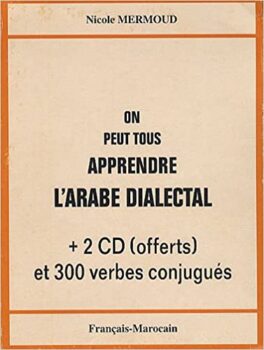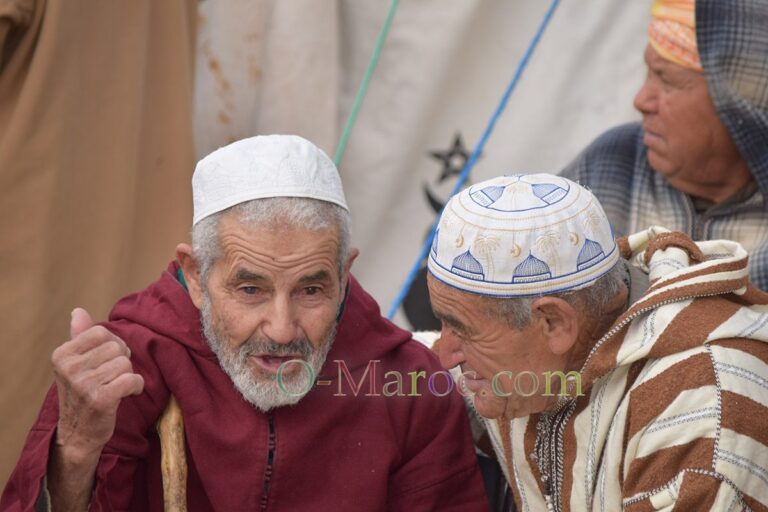Arabic, Darija, Berber, or all three
There are many languages spoken in Morocco: Amazigh joined Standard Arabic as an official language in the 2011 constitutional reform, and French is a widely used working language (contracts, legislation, etc. can be written in either language); Berber, which is now broadcast on television and taught in schools. In the north, Spanish was inherited from the colonial power. Finally, many Moroccans have studied abroad.
They also speak a dialect of Arabic, known here as Darija.
There are several versions of Berber: Tamazight from the Central Atlas, Tachelhit from the Sous, Tarifit from the Rif… words from each of these languages penetrate the others, all the more easily because the basic structures of these two Semitic languages are closer to each other than to French.
Place names are often Berber, especially town names that begin with Ta, the feminine gender in Amazigh. The Tizi (ⵜⵉⵣⵉ) are mountain passes (so you shouldn’t say the Tizi n’Tichka pass), the Ifri (ⵉⴼⵔⵉ) are caves, the Ighil (ⵉⵖⵉⵍ) are hills, the assifs (ⴰⵙⵉⴼ) are rivers, wadis ( وادي ) in Arabic. The jbel ( جبل ) is also an Arabic word, in Amazigh we speak of adrar (ⴰⴷⵔⴰⵔ)…
Even in the heart of Berber country, certain Arabic words have taken root, such as the word Kasbah ( قصبة ) which comes from the Arabic word for a reed (which also gave rise to the calamus), and which we would rather call igherm (ⵉⵖⵔⵎ) in Amazigh. The medina ( مدينة ) simply refers to the city, which may be (relatively) new like Fez El Jedid or El Jadida.
Greetings
To greet each other is first to exchange wishes of peace for the other, ‘Salam aleikoum’ ( ٱلسَّلَامُ عَلَيْكُمْ ) (which is the root of salamalec).
Immediately after that, we’re going to wonder if ‘things are going well’ (Labès? ( لا بأس ) Maantanit? in Berber) and never be satisfied with ‘good, thanks be to God’ (Labès Bekher, Hamdulillah, Koulchi labès, koulchi mziane, barakallahoufik). So we checked that everything was fine, the house (Tiguemmi (ⵜⵉⴳⵎⵎⵉ) in Amazigh), the family (Familia in Darija), the children (Isharan (ⵉⵛⴰⵔⴰⵏ), Tarwa (ⵜⴰⵔⵡⴰ) or Tazanine (ⵜⴰⵣⴰⵏⵉⵏ) in Berber), work, health, and all the family members you know.
And each time assure the other that all is well.
You can also say, in Berber ‘Azul’ (ⴰⵣⵓⵍ) or ‘Lâaoun’, and in Arabic, if it’s morning, ‘Sba el kher’ ( صباح الخير ) (Morning happiness), and in the afternoon, ‘Massa el kheir’ ( مساء الخير ) (Evening happiness).
If we’re parting for a little while, we’ll say in Berber ‘haraska’ (see you tomorrow), ‘haraska sba’ (see you tomorrow morning), or ‘harasra’ (see you later).
And to say thank you, we’ll say choukran ( شكرا ) (bezaf ( بزاف ) for a lot), to which we’ll reply ‘Llah choukran allah wajib’ ( لا شُـكرا على واجـب ), or ‘Blajmil’ ( بلاجميل ) or ‘Afwan’ ( عفوا ) (but the latter much more rarely). When you want to ask for something, it will be ‘min fadlik’ ( من فضلك ) or ‘aafak’ ( ﻋﻔﺎﻙ ).
The food

This important aspect of Moroccan hospitality is reflected in your hostess’s insistence that you finish the dish, tisch in Berber, koul in Arabic. Once you’ve feasted on the bread (khrobs ( خبز ) in Arabic, aghrum ⴰⵖⵔⵓⵎ in Berber), tajine, and tea, atay ( أتاي ) in Darija, chaÿ ( شاي ) in standard Arabic, either with mint, bin nâa-nâ ( بالنعناع ) or with absinthe bin chebâa ( شيح ), you will tell him that you thank God for the end of this meal, ‘Llah ekhlef’, unless you still have some room for a coffee, khawa ( قهوة ), possibly with milk, halib ( حليب ).
Apprendre le marocain.
There are not that many ressources to easily learn darija. You can find some Youtube channels, which are not always very pedagogical. The curriculum of the Peace Corps is useful and easy to find on the internet. And if you also speak French, an excellent book, in Roman alphabet transcription, ‘On peut tous apprendre l’arabe dialectal’. With its extensive vocabulary and explanations of Moroccan life, ‘On peut tous apprendre l’arabe dialectal’ by Nicole Mermoud is only available in Morocco and can be bought on Amazon in its new edition, with two CDs… or of course in bookshops in Morocco.
Added Arabic and Amazigh transcriptions, and corrected some words… this post was written ‘by ear’ a long time ago!
I’ve also corrected the status of French, which is not an official language but a working language.
 A typo or syntax error? You can select the text and hit Ctrl+Enter to send us a message. Thank you! If this post interested you, maybe you can also leave a comment. We'd love to exchange with you !
A typo or syntax error? You can select the text and hit Ctrl+Enter to send us a message. Thank you! If this post interested you, maybe you can also leave a comment. We'd love to exchange with you !




